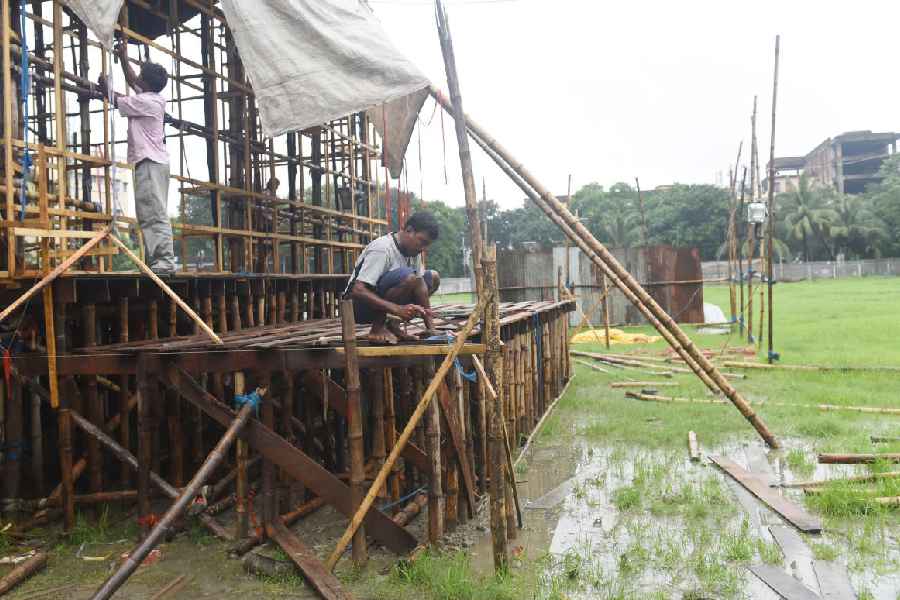Soaked reality
Sir — Rain has long been Bengal’s favourite metaphor, whether in Tagore’s verses or in the bhadralok’s nostalgia for kalbaisakhis viewed safely through a window. September’s record rainfall brought similar romanticisation of the rain in parts of the city. While Durga Puja themes speak of politics, loss, and resistance, the real story of loss lies outside these fantastic installations. When people talk about the rain putting a damper in Pujas, do they think of the lives of artisans who build the spectacles while living closest to waterlogged lanes? It is remarkable how easily rain shifts from being an emblem of poetry to an inconvenience dismissed once the streets dry without a thought for the devastation it leaves in its wake for the less privileged.
Ratna Datta,
Calcutta
Mixed bag
Sir — The Reserve Bank of India has maintained a neutral stance by holding the repo rate at 5.5%. This decision reflects caution in the face of global uncertainty and softer inflation. On the one hand, it protects borrowers from rate shocks and gives time for prior rate cuts to have an impact. On the other, it may slow momentum in sectors that wait for further stimulus. If tariff tensions or input costs rise, this pause may prove risky. The central bank must be ready to react rather than stay anchored to its position.
Fakhrul Alam,
Calcutta
Sir — Holding the repo rate unchanged offers stability to households with loans as their repayment instalments will remain steady. That is a clear advantage in a volatile world. The downside is that sectors dependent on fresh investment may feel starved of support, especially where the marginal cost of funds-based lending rate adjustment is lagging. If inflation unexpectedly accelerates, this neutral posture may leave the RBI playing catch-up. The move may be prudent for now but it hinges on how stable the economy remains in the long run.
Anupam Neogi,
Calcutta
Sir — The pause in repo rate cut will give banks breathing room to calibrate their cost structures without sudden regulatory pressure. The flexibility is welcome. But banks may still raise MCLR-linked rates, passing on costs to consumers despite the repo rate holding steady.
Kamal Laddha,
Bengaluru
At an impasse
Sir — The United States of America’s government has officially shut down after the Senate failed to pass a funding extension. The vote fell short at 55-45, leaving hundreds of thousands of federal employees facing furloughs. President Donald Trump has blamed the Democrats for the deadlock and threatened further cuts to the federal workforce, while Democrats argue that the shutdown stems from the Republican refusal to protect healthcare subsidies. With most agencies halting non-essential functions, the shutdown highlights how basic governance has become hostage to political confrontation in Washington.
Ajay Tyagi,
Mumbai
Sir — The present governmental shutdown in the US is the fifteenth since 1981. Federal agencies have begun implementing contingency plans, shutting down research, customer service, and regulatory activity, while military, border guards, and law enforcement must continue without pay. The dispute is centred on the Democrats demanding renewed subsidies under the Affordable Care Act, which Republicans want to separate from budgetary negotiations. The result is stalled services, unpaid staff, and an economy that loses roughly $400 million daily.
Paresh Kanungo,
Dibrugarh
Sir — Recent political developments in the US underline the deep divide in Washington. Republicans, who control both chambers, failed to secure a temporary funding resolution despite holding the majority. The standoff left 750,000 federal employees furloughed and 11,000 Federal Aviation Administration staff facing layoffs, with potential disruption to air travel. Governance has turned into partisan warfare in the US with common people bearing the brunt of these disruptions.
Arun Kumar Baksi,
Calcutta
Wide gap
Sir — A recent study by the Nobel laureates, Esther Duflo and Abhijit Banerjee, shows a gap between ‘street maths’ and ‘school maths’ in India. Children adept at handling market calculations often struggle with classroom equations, while academically proficient students stumble in everyday lives. Personal experience confirms this: I know of a school dropout who was unable to memorise number tables but quickly mastered calculations when running a grocery store. His skill emerged from necessity and repeated practice. Modern education must integrate practical applications, linking abstract concepts to daily life. Doing so could nurture both academic understanding and functional numeracy, bridging the divide between classrooms and real-world problem-solving.
Vinay Asawa,
Howrah
Sir — The contrast between school learning and practical skills among Indians is striking. Children may fail tests yet handle complex transactions effortlessly outside the classroom. Educational reforms connecting abstract lessons to everyday activities like shopping, cooking, and gardening can enhance students’ engagement, reduce dropout rates, and prepare pupils for actual challenges.
Anil Bagarka,
Mumbai
Crushed spirit
Sir — Narrow lanes clogged with traffic, long queues, the crush of bodies and loud music are just some of the things that make Durga Puja insufferable for some residents of Calcutta. The festival used to be about more than ticking off a list of pandals that one has visited.
Lalitha Joseph,
Malappuram, Kerala










